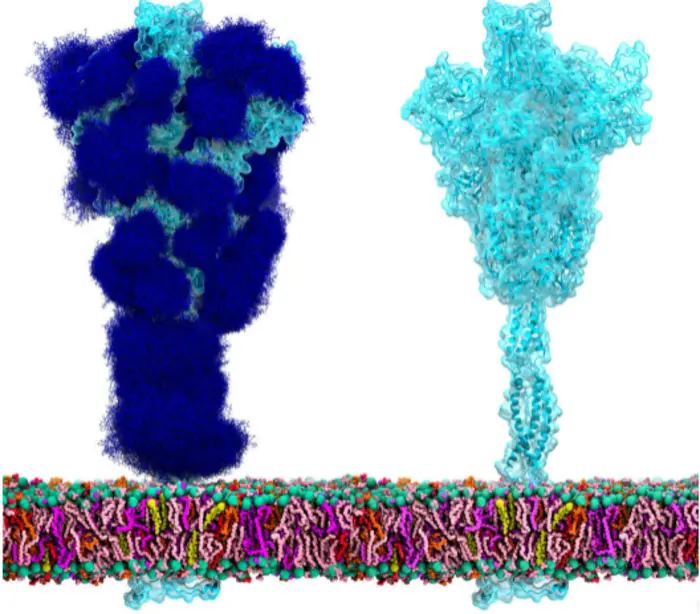In a groundbreaking advance in the field of immunology, scientists have developed a novel “low-sugar” vaccine that aims to provide a broad protective effect against various coronaviruses, including the one responsible for COVID-19. Recent studies conducted at Scripps Research reveal that the newly engineered vaccine targets not only the virus itself but also the sugar molecules, known as glycans, that cloak the virus, thereby shielding it from detection by the immune system. This innovative strategy harnesses the potential to create long-lasting immunity, simplifying the vaccination process for future infectious disease threats.
The research led by Chi-Huey Wong, a distinguished chemistry professor at Scripps, posits that sugar molecules on the spike protein of coronaviruses serve as a protective shield. By removing these non-essential glycans through enzymatic processes, the vaccine enables the immune system to recognize and respond more effectively to the virus. Animal studies conducted during this research, particularly involving hamsters and mice, indicated that this approach produced a higher concentration of diverse antibodies, offering better protection than conventional vaccines that target individual strains.
Wong emphasized the unprecedented need for frequent updates to vaccines in response to mutations in the SARS-CoV-2 virus, underscoring the advantage of a universal vaccine. Targeting conserved, low-mutation regions of the virus allows this low-sugar vaccine to effectively prepare the immune system to respond not only to current variants but also to future coronavirus strains. The implications of this research extend beyond COVID-19, potentially covering other variants and related viruses, including those responsible for the flu and even the common cold.
Presenting his findings at the ACS Spring 2025 Digital Meeting, Wong details the mechanisms through which the vaccine operates. The breakthrough hinges on the identification of a stable region within the stalk of the viral spike protein, devoid of significant mutation. By eliminating the sugar molecules that typically obscure this region, Wong’s team was able to elicit a strong immune response, improving the specificity and efficacy of the antibodies generated against viral vectors.
The significance of Wong’s findings also lies in their potential application beyond viral infections. The same methodology that enabled the development of the low-sugar vaccine is being explored in other fields, such as oncology. Wong’s team is investigating the use of sugar manipulation to target cancer cells, a promising avenue that could revolutionize treatment strategies in oncology. Their recent publications in the Journal of the American Chemical Society reflect this dual focus on vaccines and cancer therapies, further underlining the versatility and potential impact of their research.
Conducted with the backing of Academia Sinica, the study contributes to a growing body of evidence suggesting that glycosylation plays a pivotal role in the interaction between pathogens and their hosts. By modulating the glycan structures present on viruses, researchers are uncovering new pathways to enhance vaccine efficacy. The low-sugar vaccine not only presents a solution to tackling rapidly mutating viruses but also introduces a paradigm shift in vaccine design, where carbohydrate structures are actively manipulated to achieve desired immune responses.
As the world continues to grapple with infectious diseases, this research opens up exciting possibilities for universal vaccination strategies. Wong’s universal vaccine may one day pave the way for a single-shot approach to immunization against an array of coronaviruses, greatly simplifying public health initiatives and improving global health outcomes. The promise of such vaccines lies not only in their effectiveness but also in their ability to ease the logistical burdens associated with mass vaccination campaigns, particularly in low-resource settings.
The research community eagerly anticipates the outcomes of an ongoing Phase I clinical trial, spearheaded by Rock Biotherapeutics, aimed to evaluate the safety and efficacy of this revolutionary vaccine in human subjects. Wong’s detailed insights during the ACS meeting will provide critical information on the future of this vaccine, aiding in the transition from laboratory findings to real-world solutions against viral infections.
With viral mutations consistently reshaping the landscape of infectious disease, the development of a low-sugar vaccine reflects a proactive approach in vaccine research. It embodies the spirit of scientific innovation, utilizing advanced biotechnology to refine the human immune response and fortify collective defenses against emerging health threats. The implications of this research are profound, as it represents a potential turning point in vaccination strategy that could usher in a new era of public health preparedness.
Ongoing dialogues within the scientific community regarding the utility of low-sugar vaccines may prompt additional research avenues, further enhancing our understanding of viral immunology and paving the way for next-generation therapeutics. As the findings from Wong’s studies continue to unfold, the scientific community remains hopeful and engaged, recognizing that the adaptation of vaccine strategies is essential in the ever-evolving battle against infectious diseases.
Importantly, the collaboration among researchers, healthcare professionals, and pharmaceutical entities will be crucial in moving this promising research from the bench to the bedside. This initiative not only encourages innovative applications of vaccine technology but also fosters a unified approach to combatting infectious diseases globally, building resilience through science and teamwork.
Subject of Research: Development of low-sugar universal vaccines targeting coronaviruses.
Article Title: Development of low-sugar universal vaccines and glycoengineered antibodies with improved Fc-mediated killing.
News Publication Date: March 25, 2025.
Web References: ACS Spring 2025 program.
References: Glycan targets on cancer cells; Enzymes linked to the synthesis of glycans on cancer cells.
Image Credits: Lorenzo Casalino.
Keywords
Vaccine development, COVID-19 vaccines, glycosylation, immunology, low-sugar vaccine, coronavirus, universal vaccine, animal studies, antibody diversity, public health.




